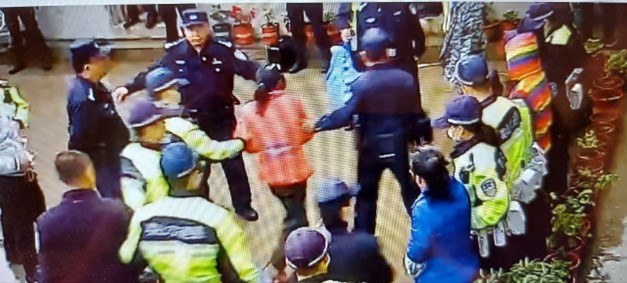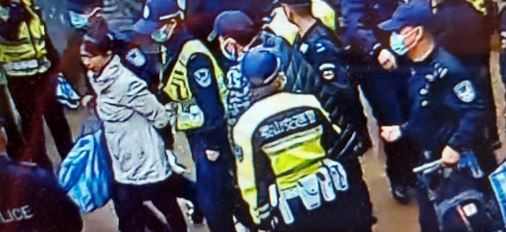A member who escaped abroad reports to “Bitter Winter” the terror of the new raids against an idiosyncratic but peaceful new religious movement.

On July 3, 2025, a sudden and sweeping crackdown shattered the lives of members of the Life Zen Temple (Lifechanyuan) in China. Coordinated by China’s Ministry of Public Security, the operation detained 82 members (and possibly more) across multiple provinces. Homes were raided, phones and computers seized, and individuals interrogated, threatened, and coerced into signing ideological documents denouncing their beliefs.
“Bitter Winter” has been the only Western media outlet to report on the story of the Life Zen Temple, an idiosyncratic but peaceful mixture of Maoism, Buddhism, and free love, and the massive crackdowns of 2021, followed by the state-sponsored deprogramming of the arrested members. Meanwhile, the leader and several members had moved to Canada, where the Life Zen Temple is now headquartered. I am also the author of the only scholarly articles on the Life Zen Temple published in languages other than Chinese. I have interviewed a member who lives in Thailand about what happened last month in China.
“The place that once gave me spiritual rebirth and helped me reclaim the meaning of life is now labeled an ‘illegal organization,’” said Jiejing, a longtime Temple devotee now living in Thailand. “Even the overseas Second Homes [the name the Temple uses for its communities] may be dragged into the storm.”
As presented by Jiejing, the organization founded by Zhang Zifan (Xuefeng), Life Zen Temple, promotes communal living, ecological harmony, and spiritual reverence. Its “Second Home” communes once flourished in China, offering an alternative to materialism and traditional family structures. But authorities branded it a xie jiao, disbanded its communities, and began hunting its members.
Between 2011 and 2014, Jiejing lived in several branches—from Yunnan to Jiangsu to Xinjiang—experiencing what she calls “the purest chapter of my life.” But by 2015, every branch she knew had been raided, and her spirit collapsed.
“Even living peacefully, farming simply, and helping one another can, in some eyes, be seen as ‘dangerous,’” she said.
Returning to secular life, Jiejing tried to conform. Between 2015 and 2022, she worked in e-commerce, education, and foreign trade. But the machinery of routine drained her soul. Marriage—entered under societal pressure—became a prison. Her health deteriorated. Diagnosed with plasma cell mastitis, she underwent eleven surgeries. Her husband responded with cruelty.
Her father died in 2019. Her mother succumbed to multiple myeloma in 2023. Financial strain, emotional collapse, and isolation pushed her to the brink.
“It felt as if the entire world had forgotten I existed,” she said.
In her darkest hour, Life Zen Temple’s Guide, Xuefeng, arranged for her to join a branch in Thailand. Here, amid mango orchards and lotus ponds, she found healing.
“My heart gradually found peace,” she said. “My weight dropped from 95kg to 60kg. Life began to shine with renewed light.”
Her days are filled with mowing, planting, sweeping, and sharing Life Zen Temple’s values in English. There is no supervision—only devotion. Although threatened by the usual Chinese transnational pressures against religion-based refugees abroad, the community lives openly on temple land, in full view of local villagers and a local Buddhist abbot, who have welcomed them for over six years.
“True freedom comes when I learn to live in harmony with heaven, earth, and all beings,” she said.
One of Life Zen Temple’s most controversial values is “freedom in emotional love and sexual love.” Critics have labeled it promiscuous. But Jiejing insists it is anything but.
“Our freedom is not chaotic indulgence—it is grounded in complete consent, mutual respect, and a high level of civility and responsibility,” she said.
The July 3 operation was brutal and deeply personal. Here are the voices of those caught in its wake (note that all members call themselves “Celestials”) transmitted through Jiejing:
These testimonies reveal not just repression—but resistance, dignity, and a refusal to surrender the soul.

“As of this month [August], a total of sixteen members in mainland China remain missing since July 2,” Jiejing said. “Those still in China are at risk of immediate detention if they show minimal activity on our internal website or participate in any Life Zen Temple-related events.”
Life Zen Temple is a legally registered nonprofit organization in Canada. It operates two branches: a bed and breakfast and a resort.
“We are not escaping reality,” Jiejing said. “We are sincerely exploring a more peaceful, genuine, and compassionate way of life.”
“I ask for nothing more than this: that such a simple, peaceful, and loving way of life—even if not yet fully understood—can at least be gently allowed to exist,” she said.
In a world increasingly hostile to spiritual diversity, Life Zen Temple’s story is a quiet cry for recognition, not of doctrine, but of dignity. For Jiejing and others like her, Life Zen Temple is not a “cult”—it is a sanctuary.
Source: Bitter Winter












